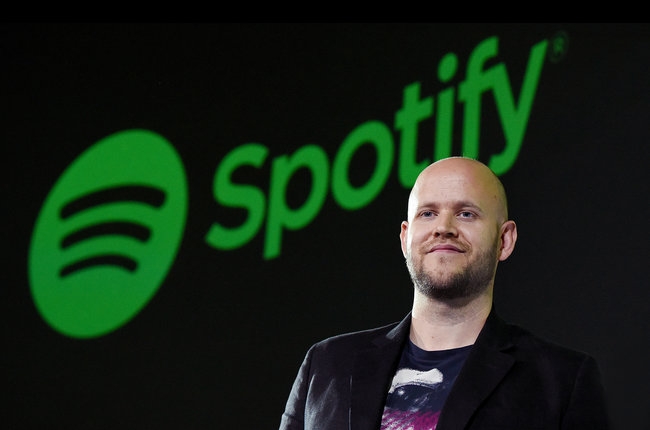Spotify, facing a lawsuit claiming "staggering" copyright infringement, is attempting to distinguish itself from illegal file sharing services of yore and putting an issue front and center that will likely command notice throughout the entertainment and tech sectors. Namely, in court papers filed Wednesday, Spotify argues that "streaming" implicates neither reproduction nor distribution rights under copyright law.
Bob Gaudio, a songwriter and founding member of the group Frankie Valli and the Four Seasons, is suing Spotify in the wake of the company's proposed $43 million settlement in a class action. In Gaudio's lawsuit, that settlement is called an "empty gesture that encourages infringement and is entirely insufficient to remedy years of illegal activity."
Spotify licenses sound recordings from record labels and also has blanket licenses from the likes of ASCAP and BMI so that it may publicly perform musical compositions.
What Gaudio's lawsuit alleges — as did the prior class action — is Spotify violating the reproduction rights of publishers and songwriters. Those making a mechanical reproduction of a musical composition can obtain a compulsory license and bypass having to negotiate terms with publishers. However, those doing so have to follow certain protocol like sending out notices and making payments. The lawsuit claims that Spotify hasn't done an adequate job of doing this.
In the past, Spotify has pointed to the difficulty of locating the co-authors of each of the tens of millions of copyrighted musical works it streams. It fought the class action mainly on jurisdictional grounds as well as challenging whether the lawsuits were ripe for class treatment.
But Spotify seems prepared to go another step and set off a legal firestorm by now challenging what rights are truly implicated by streaming.
"Plaintiffs allege that Spotify 'reproduce[s]' and 'distribute[s]' Plaintiffs’ works, thereby facilely checking the boxes to plead an infringement of the reproduction and distribution rights," states a Spotify motion for a more definitive statement from the plaintiffs. "But Plaintiffs leave Spotify guessing as to what activity Plaintiffs actually believe entails 'reproduction' or 'distribution.' The only activity of Spotify’s that Plaintiffs identify as infringing is its 'streaming' of sound recordings embodying Plaintiffs’ copyrighted musical compositions. But 'streaming' – by its very definition – cannot infringe upon either the reproduction right under 17 U.S.C. § 106(1) or the distribution right under 17 U.S.C. § 106(3). As a consequence, Plaintiffs’ allegations simply do not inform Spotify how Spotify is alleged to have violated the law."
Spotify rejects the proposition it is the new Napster.
"Spotify bears no resemblance to Napster," its lawyers write. "[I]t is likewise wholly unlike any other 'primitive illegal file sharing company' (i.e., Napster, Scour, Aimster, Audiogalaxy, Morpheus, Grokster, Kazaa, iMesh, and LimeWire). Its business practices bear no resemblance to those piratical and unlawful peer-to-peer networks. Nor does its technology."
Adds Spotify, "In fact, courts have acknowledged a key distinction between streaming and downloading — like the downloading facilitated by the 'illegal file sharing companies' that Plaintiffs reference in their Complaint... If a service enables users to download a song, then that service engages in the 'reproduction and distribution of a sound recording' and of the musical composition that sound recording embodies. But if the service streams a song, then the stream is an 'isolated public performance of a sound recording,' and of the musical composition that sound recording embodies."
To be clear, Spotify is acknowledging that it must pay for the public performance of works. But the argument that streaming entails no reproduction is likely to be controversial. It also flies in the face of what Spotify has previously said. For example, Spotify's head of licensing James Duffett-Smith wrote in a comment to the U.S. Copyright Office in 2014, "To operate the Spotify Service, Spotify needs to secure multiple rights from multiple copyright owners. These rights include, among others, the right to reproduce sound recordings and the musical works embodied therein, the right to distribute sound recordings and the musical works embodied therein, and the right to publicly perform sound recordings and the musical works embodied therein by means of digital audio transmissions."
There have been cases that have dealt with some of the issues that appear to be coming. For example, see the 2nd Circuit's opinion nearly a decade ago regarding Cablevision's remote-DVR service and buffer copies of transitory duration. More often than not, however, copyright holders have asserted violations of reproduction rights by streaming services with judges gliding past the issue. For example, the Supreme Court opinion in Aereo focused more on public performance even though broadcasters had claims over reproduction rights too. Just last week, the 9th Circuit affirmed a ruling that VidAngel's streaming service infringed movie studios' reproduction rights, but spent most of the discussion on other issues.
In its brief, Spotify discusses some case law and scholarly work, and says that if Gaudio is really alleging temporary copying, then it's prepared to assert a fair use defense.
Spotify, represented by Simpson Thacher attorneys Jeffrey Ostrow and Christopher Sprigman and local counsel, is also skeptical about the timing of the lawsuits.
"A Rule 12(e) motion is particularly appropriate here, where Plaintiffs’ dishonest portrayal of Spotify’s (licensed) streaming service as willful infringement on a 'staggering scale,' and their failure to specify the conduct that is alleged to infringe, is no accident," states the brief. "It is, rather, a bid to interfere with the court-approved settlement in Ferrick. It appears that, by falsely painting Spotify as a new Napster and by holding out the prospect of hundreds of millions of dollars in statutory damages, Plaintiffs and their counsel hope to entice additional class members to opt out."
This article was originally published by The Hollywood Reporter








